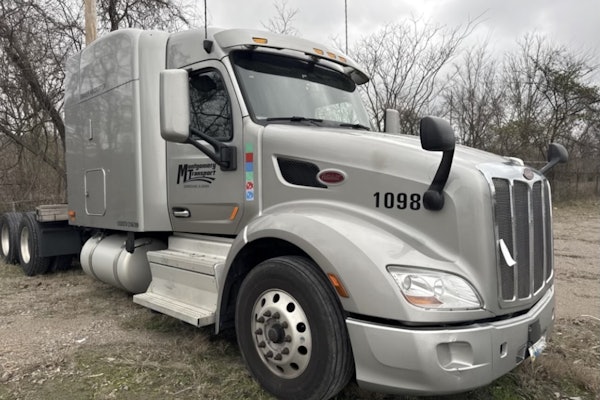The heavy vehicle use tax imposed by Sec. 4481 of the Internal Revenue Code is an excise tax entitled to priority treatment in bankruptcy proceedings, the U.S. Court of Appeals for the Eighth Circuit ruled last month. The issue arose in the context of the liquidation of Trism Inc., which filed for bankruptcy protection in December 2001. (Case No. 04-6010 WM)
CRST Van Expedited lost its bid for a temporary restraining order to stop J.B. Hunt from hiring six drivers that had agreed to stay with CRST for at least one year under the terms of an agreement that covered the drivers’ training expenses.
A federal judge in Utah rejected C.R. England’s effort to refer to arbitration claims by the Owner-Operator Independent Drivers Association and several owner-operators against the carrier’s independent contractor agreement, OOIDA reported. U.S. District Judge Ted Stewart ruled, among other things, that owner-operators are exempt from arbitration under the Federal Arbitration Act and that requiring owner-operators to pay half the arbitration cost made it an “inaccessible forum” for resolving their claims.
Volvo Trucks North America failed to convince a federal appeals court to overturn a jury verdict in favor of Reeder-Simco GMC. The Fort Smith, Ark., truck dealer charged that the truck maker violated federal and state laws by refusing to grant it price concessions as favorable as those given other Volvo dealers similarly situated. (U.S. Court of Appeals for the Eighth Circuit; Case No. 02-2462)
Q I understand that major carrier and shipper groups have agreed to a model Shipper-Carrier Contract. Is this true, and what do you think of it?
A The American Trucking Associations and The National Industrial Transportation League have agreed to the terms and conditions of a model truckload contract, which can be found with commentary at www.trucking.org. The agreement, while lengthy, is comprehensive and addresses the accessorial service issues often left out of contracts.
I applaud both the ATA and the NITLeague for working through the issues that often divide shippers and carriers and for obtaining Justice Department approval to publish this collaborative effort.
In my book, Protecting Motor Carrier Interests in Contracts, I discuss the “Dirty Dozen” – 12 egregious contract provisions most often seen in shipper- and broker-drafted contracts. The model agreement steers clear of the most troublesome provisions I discussed. It requires payment of freight charges on time and without offset. There are provisions for interest and attorney’s fees in the event payment is not received in time. Overage, shortage and damage claims must be handled in accordance with the Carmack Amendment without special or consequential damages. The indemnity provision is reasonable, requiring only that you hold the shipper harmless from negligent acts or omissions of your employees and agents.
The model agreement includes provisions for important accessorial charges such as free time, detention and truck ordered but not used. The contract also addresses many of the nasty surprises I have cautioned about in prior articles.
Other issues of concern to shippers such as prohibition against double brokering without approval, reasonable assurances concerning insurance levels and inclusion of an arbitration clause are all present.
While it may be preferable for one to provide common carrier service under a bill of lading and a properly worded rules circular, if the written bilateral contract is a pre-condition for serving a shipper, the model ATA/NITLeague agreement is a good place to start. Moreover, because this contract has the blessing of one of the most reputable shippers groups, it is an evenhanded basis from which to begin negotiating.
Ohio Court rejects reefer tax
Ohio Supreme Court ruled unanimously in June that refrigerated units attached to trailers are an integral part of the vehicle to which they are attached and are not subject to the state’s ad valorem personal property tax. In 1999, the Ohio Department of Taxation decided to assess a tax on reefer units of about $370 to $840 per unit per year. The Ohio Trucking Association and several members challenged the tax in court.
As registered motor vehicles, semitrailers are exempt from Ohio’s personal property tax. The tax commissioner contended, however, that reefer units are subject to the tax because they don’t serve the inherent motor vehicle function of carrying a load, such as propelling a vehicle and holding or containing cargo.
The state Supreme Court rejected this reasoning, saying that reefer units are necessary to the transportation of temperature-controlled loads and that the units have no function apart from the trailer. The court suggested that under the tax commissioner’s approach, a trailer’s roof might not be considered integral to the trailer since a roof isn’t essential for carrying cargo. “We submit, however, that a roofless semitrailer would not be of much use in carrying a load of computers in a rainstorm.” (Parisi Transportation Co. v. Wilkins; Case No. 2002-2221)
Ohio Court rejects reefer tax
Ohio Supreme Court ruled unanimously in June that refrigerated units attached to trailers are an integral part of the vehicle to which they are attached and are not subject to the state’s ad valorem personal property tax. In 1999, the Ohio Department of Taxation decided to assess a tax on reefer units of about $370 to $840 per unit per year. The Ohio Trucking Association and several members challenged the tax in court.
As registered motor vehicles, semitrailers are exempt from Ohio’s personal property tax. The tax commissioner contended, however, that reefer units are subject to the tax because they don’t serve the inherent motor vehicle function of carrying a load, such as propelling a vehicle and holding or containing cargo.
The state Supreme Court rejected this reasoning, saying that reefer units are necessary to the transportation of temperature-controlled loads and that the units have no function apart from the trailer. The court suggested that under the tax commissioner’s approach, a trailer’s roof might not be considered integral to the trailer since a roof isn’t essential for carrying cargo. “We submit, however, that a roofless semitrailer would not be of much use in carrying a load of computers in a rainstorm.” (Parisi Transportation Co. v. Wilkins; Case No. 2002-2221)








